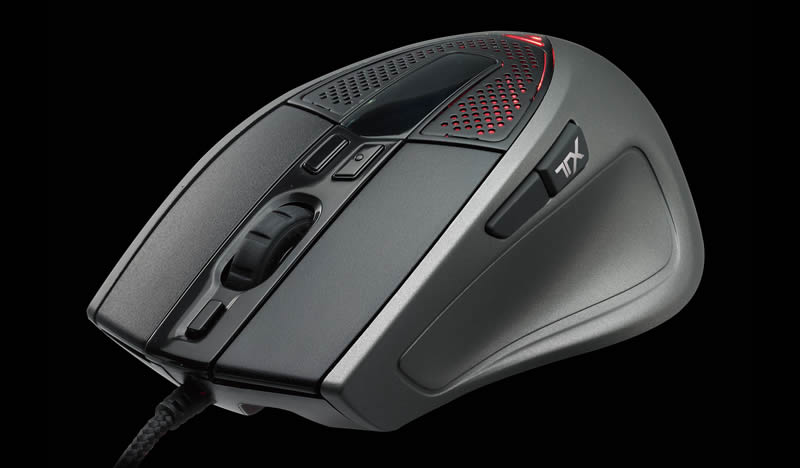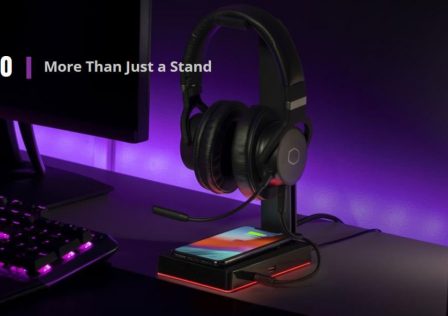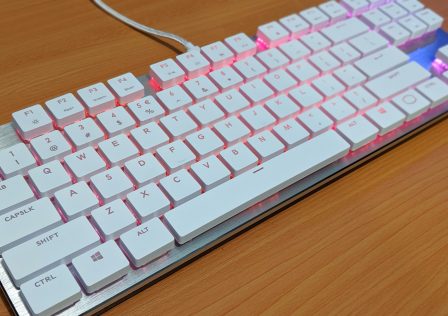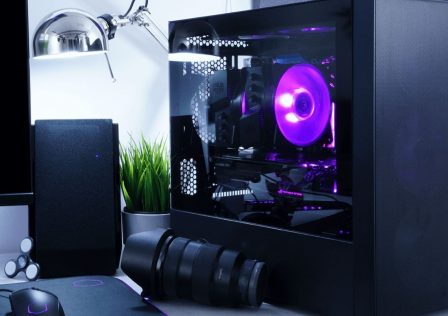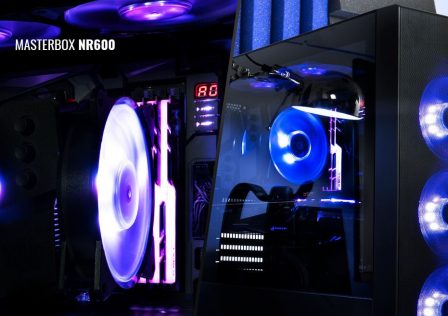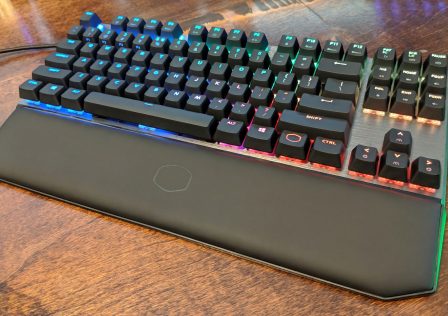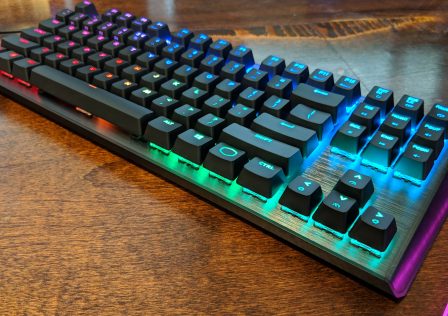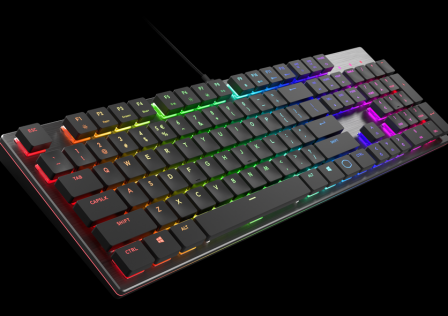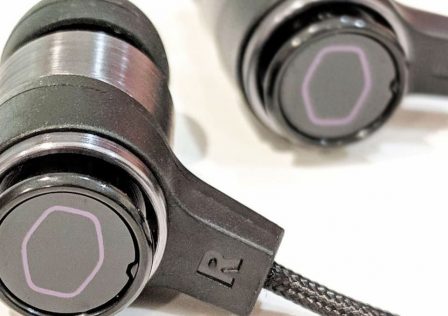The Sentinel Advance II is the latest mouse from Cooler Master. It is the second revision of the Sentinel mouse lineup, with the first being the Sentinel Z3RO-G. The shape and general design of the mouse has never changed, but its technology has. Designed with the new Avago 9800 laser sensor, the Sentinel Advance II looks like a promising tool for gamers and enthusiasts. Lets see if this new mouse continues Cooler Master’s trend of excellent gaming mice.
Packaging & Specifications
- Latest Avago ADNS-9800 Laser sensor
- 200 – 8200 DPI tracking resolution
- 128KB Sentinel-X Memory for profiles and macros
- On-the-fly DPI adjustments (+/- 200 DPI)
- As little as 1.5mm lift-off distance
- Up to 150 IPS – 3.8 m/s
- 125Hz – 1000Hz USB rate fine-tuning
- 5 profiles with 4 DPI settings each
- 8 programmable buttons
- 9 additional virtual buttons via button combinations
- Right-hand Ergonomic palm grip design
- Customizable OLED logo
- Customizable multi-color LED light system
- 5 x 4.5g weights for fine-tuning mouse feel
Long list of features, isn’t it? Most of it resembles the older Sentinel gaming mice, with the exception of the DPI rating. Max. 8200 DPI? That’s the highest I’ve ever heard of. I remember Cooler Master wowing people with the 5600 DPI original Sentinel Advance. For the few people who thought that 5600 DPI somehow isn’t enough, maybe this will fit your needs. 128KB onboard memory is more than the original Sentinel Advance, and the same as the Sentinel Z3RO-G.
 Many features are listed on the back.
Many features are listed on the back. Opening it up, you’ll find images with descriptions, and the mouse itself hiding underneath plastic. A note on warranties is included, as well as a sheet telling you that the software is on the CM Storm website. It isn’t there yet, but it will be by the time any of you purchase this mouse.
Opening it up, you’ll find images with descriptions, and the mouse itself hiding underneath plastic. A note on warranties is included, as well as a sheet telling you that the software is on the CM Storm website. It isn’t there yet, but it will be by the time any of you purchase this mouse.

Closer Look
 The USB cable is fully braided, more nice sleeving from Cooler Master. The USB connector is gold plated.
The USB cable is fully braided, more nice sleeving from Cooler Master. The USB connector is gold plated. Here’s a shot of the front of the mouse. The left and right mouse buttons are slightly textured, which is good for your grip. The scroll wheel is very hefty, and every increment is easily felt (opposed to smooth scroll wheels). It doesn’t turn left or right, but it does function as the third button. People complained about the old Sentinel Advance having too stiff a scroll wheel button. They’ve addressed the issue with the Sentinel Advance II, and is now easy to press. Three additional buttons can be seen on the surface: the two small parallel buttons behind the scroll wheel cycle through four DPI settings, while the other one in front of the scroll wheel cycles through the five available profiles. It has two side buttons as well, giving a total of eight buttons.
Here’s a shot of the front of the mouse. The left and right mouse buttons are slightly textured, which is good for your grip. The scroll wheel is very hefty, and every increment is easily felt (opposed to smooth scroll wheels). It doesn’t turn left or right, but it does function as the third button. People complained about the old Sentinel Advance having too stiff a scroll wheel button. They’ve addressed the issue with the Sentinel Advance II, and is now easy to press. Three additional buttons can be seen on the surface: the two small parallel buttons behind the scroll wheel cycle through four DPI settings, while the other one in front of the scroll wheel cycles through the five available profiles. It has two side buttons as well, giving a total of eight buttons. That top vented area reveals an LED, as you’ll see later. Like the previous Sentinel mice, an OLED screen is positioned on top which shows the current DPI setting as well as a CM Storm logo, which can be customized as you’ll see later. A nice feature is that the screen shots off when the mouse isn’t in use.
That top vented area reveals an LED, as you’ll see later. Like the previous Sentinel mice, an OLED screen is positioned on top which shows the current DPI setting as well as a CM Storm logo, which can be customized as you’ll see later. A nice feature is that the screen shots off when the mouse isn’t in use. Turning it upside down, you’ll find the praised sensor as well as a cover which reveals the five 4.5g weights. The Avago 9800 laser sensor is capable of 200 – 8200 DPI, a remarkable feat. It also has a very low lift-off distance rating, as little as 1.5mm. This means that if you lift the mouse off of the surface, the cursor won’t move much. This allows gamers to be more accurate when playing.
Turning it upside down, you’ll find the praised sensor as well as a cover which reveals the five 4.5g weights. The Avago 9800 laser sensor is capable of 200 – 8200 DPI, a remarkable feat. It also has a very low lift-off distance rating, as little as 1.5mm. This means that if you lift the mouse off of the surface, the cursor won’t move much. This allows gamers to be more accurate when playing.
Here’s the OLED screen. It has a slight, light-blue hue to it. A red LED can also be seen through the top, but its color can be changed.


Two additional LEDs are in the lower-front area of the mouse.


Lights out!

For those who have experience with previous CM Storm Sentinel mice, this one bears no surprises on the outside. Eight buttons, good size, perfect shape for palm-grip, textured buttons. The scroll wheel has been improved since the original. The look and construction of the mouse are superb.
Software
The Cooler Master Storm Sentinel II is compatible with software, which is found on the CM Storm site. This software is for customization. The software is not required in order to use the mouse. I’ve seen people dismiss gaming mice because they have software, which is a valid reason if the software is a requirement and you want a plug-and-play mouse. But the Sentinel Advance II does it all – it is one of the most customizable mice, but it can be used as a plug-and-play device.
 The second tab is mostly for aesthetic changes. Here you can change LED colors, with eight choices. You can also adjust LED mode – always on, breathing/pulsating, on mouse click, or off. You can also change the CM Storm logo to something else – a monochrome BMP image sized at 32×32 pixels. You may have to rotate it 90 degrees CCW as well.
The second tab is mostly for aesthetic changes. Here you can change LED colors, with eight choices. You can also adjust LED mode – always on, breathing/pulsating, on mouse click, or off. You can also change the CM Storm logo to something else – a monochrome BMP image sized at 32×32 pixels. You may have to rotate it 90 degrees CCW as well. The Sentinel Advance II also appeals to competitive gamers. The Storm TX section allows you to create custom button combinations. The eight buttons can be customized to execute macros and other commands, which is what that “virtual buttons” term refers to.
The Sentinel Advance II also appeals to competitive gamers. The Storm TX section allows you to create custom button combinations. The eight buttons can be customized to execute macros and other commands, which is what that “virtual buttons” term refers to. You can also assign macros to specific buttons in specific profiles. There are quite a few execution options in here, such as press to run once, release to run once, press to loop, release to loop, or hold to loop. You can also modify cycle time in increments.
You can also assign macros to specific buttons in specific profiles. There are quite a few execution options in here, such as press to run once, release to run once, press to loop, release to loop, or hold to loop. You can also modify cycle time in increments. The scripts section has even more execution methods. So there is plenty of customization for competitive gamers here.
The scripts section has even more execution methods. So there is plenty of customization for competitive gamers here.
There is also a library for organization and further customization.

The support section tells you about your version info, as well as support information.

My only software complaint is relating to certain sensor settings, namely motion sensitivity, button response time, and double click speed. If you change these, the next time your computer starts you must start the software in order for changes to take place. So add it to your startup program list.
Performance
To test the Sentinel Advance II, I played a variety of games such as S.T.A.L.K.E.R. Shadow of Chernobyl, Crysis, The Witcher: Enhanced Edition, and ArmA 2: Combined Operations which is one of the hardest shooters to be accurate in. While I’ve been using the claw grip for the past few months, I originally used the palm grip on an older model of the Sentinel Advance, so I still retained some familiarity with the Sentinel Advance II.
After playing ArmA 2 for a while, the accuracy of the sensor became clear. The older laser sensors used in Cooler Master mice were very good, no doubt, but this new Avago 9800 sensor is even better. If there’s no slack on the cable, even at 8200 DPI, lifting the mouse off of the surface does not make the cursor move on a flat and steady surface. Talk about low lift-off distance! This is a nice improvement indeed.
I used two mouse pads for testing: a generic rough surface pad, and a less rough CM Storm Speed RX. The Sentinel II tracked well on all of them. I didn’t have to lower motion sensitivity or run into any problems on the softer surface, like I have with other laser mice. So it looks like the Avago 9800 sensor really is optimized for various kinds of surfaces.
8200 DPI is blistering fast. I personally don’t use this setting in any game, I can’t keep up with it. The most I use is 6600 DPI. But what’s really impressive is the accuracy at 8200 DPI. I can make small, subtle movements at 8200 DPI without a problem. This mouse really works wonders – if for some reason you go anywhere as low as 200 DPI, this mouse supports it. If you demand speed, 8200 DPI provides extreme precision even for small movements. This is an impressive mouse, that’s for sure.
Conclusion
I was impressed by Cooler Master’s original Sentinel Advance when I first got my hands on it. The Storm Inferno continued to impress me. Now with the Sentinel Advance II and its new sensor, they’ve gone a step further and bested the best. This is an excellent choice for those who prefer the palm-grip and demand a top quality mouse for casual gaming or competitive gaming.
- Appearance: The Sentinel Advance II looks slick. It isn’t gaudy at all, and all of the LED and logo customization is great to have. 5/5
- Construction: This mouse is made out of durable plastics, and is quite hefty with the weights in place. Taking out the weights makes it lighter, without compromising durability. The mouse doesn’t get uncomfortable with sweaty hands either. 5/5
- Performance: Extreme accuracy from 200 DPI to 8200 DPI, even with small precise movements. The lift-off distance is incredible. Again, no complaints. 5/5
- Functionality: The software has lots of customization options, but I dislike how you have to start the software after your PC boots in order for certain sensor changes to take place. 4.75/5
- Value: The Sentinel Advance II has an MSRP of $59.99. This is a normal price for gaming mice these days, slightly less than some but it’s a good price. 4.5/5
- Overall: 97/100

